Your career at the Department of Neurosurgery
Whether as a pupil, student or in specialist training

Training and education are very important in our clinic. The Department of Neurosurgery has expertise in the treatment of diseases affecting the entire central nervous system (CNS) and manages complex cases that are both educationally valuable and pedagogically interesting. In the fields of tumour and skull base surgery, functional neurosurgery (deep brain stimulation for movement disorders, pain syndromes and psychiatric illnesses), spinal surgery (treatment of complex bony and degenerative processes, and spinal canal tumors), neurotraumatology, vascular neurosurgery and paediatric neurosurgery (treatment of skull bone malformations and tumors in the posterior fossa), we offer insights into a broad range of treatments.
You will also learn about the special intensive medical care in the neurosurgical intensive care unit. In numerous special consultation and interdisciplinary events such as the ZSN tumour board run by the Department of Neurosurgery, the interdisciplinary Pain Board, the neurovascular board and the special consultation for neurofibromatosis, you will deepen your knowledge and learn about unusual clinical pictures. This provides unique insights into the treatment of neurosurgical diseases and personalized teaching opportunities.
The following formats are offered:
Entry opportunities
Your way to us
We offer students the opportunity to gain deep insights into the world of neurosurgery. With parental permission, they can even observe surgeries from the operation room and experience firsthand how our medical team works. An experienced physician from the clinic is assigned to the students as a mentor. In addition, experienced neurosurgeons and nursing staff are available to answer questions and provide a fascinating insight into a day in the neurosurgical clinic. Through these practical experiences, we aim to encourage interest in medicine, particulary in the younger generation.
Please send applications by e-mail to: neurochirurgie@mh-hannover.de
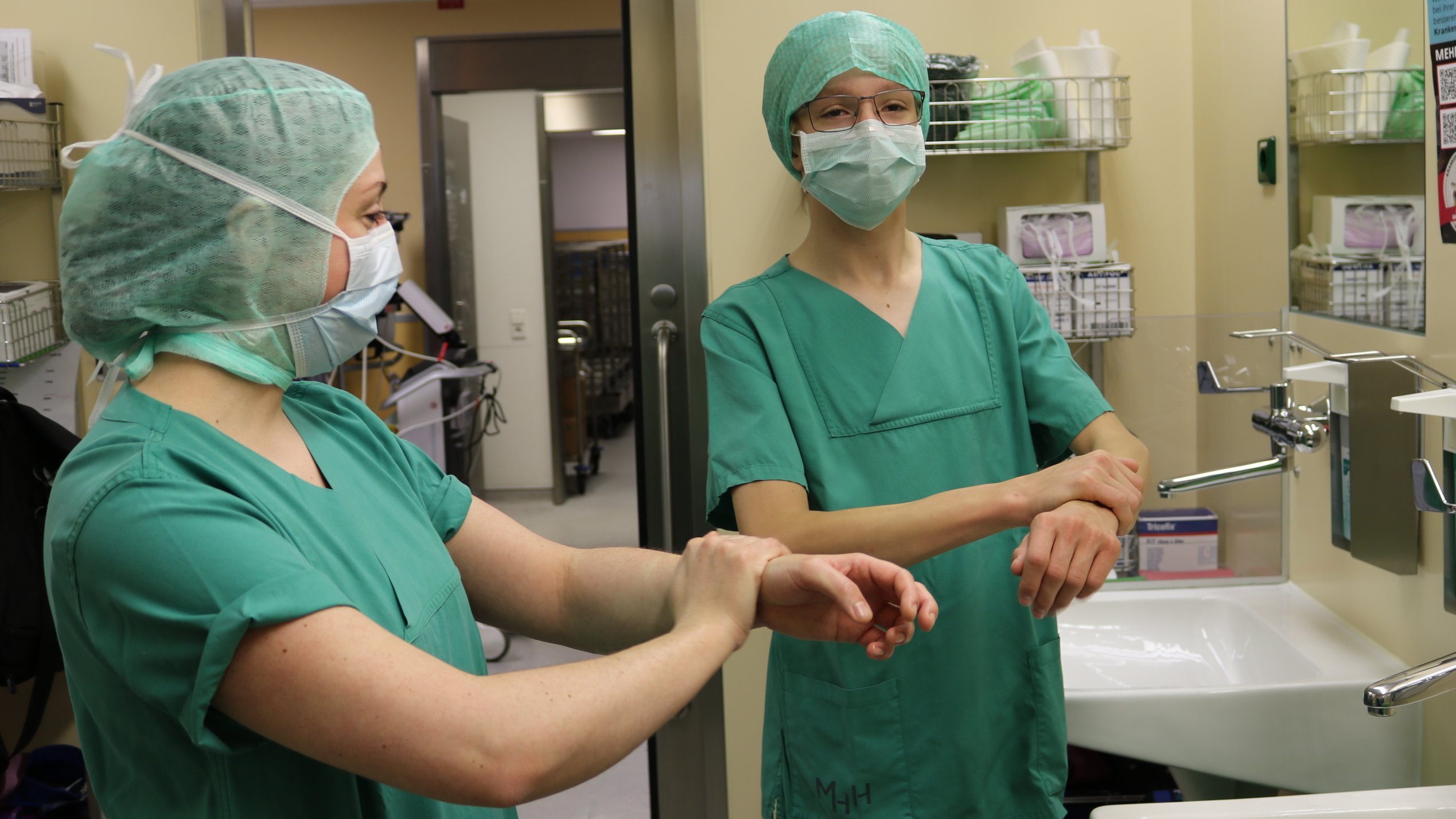
Experience neurosurgery firsthand! We offer clinical observerships for up to two months, allowing medical students and interested physicians to learn about the practical work in our clinic and gain valuable experience. Observers have the opportunity to participate in case discussions, observe surgeries and learn about the latest treatment methods. In particular, special surgical techniques can be taught. Our focus is on a practice-oriented and comprehensive education that will help you to deepen your knowledge and develop new skills.
Please send applications by e-mail to: neurochirurgie@mh-hannover.de
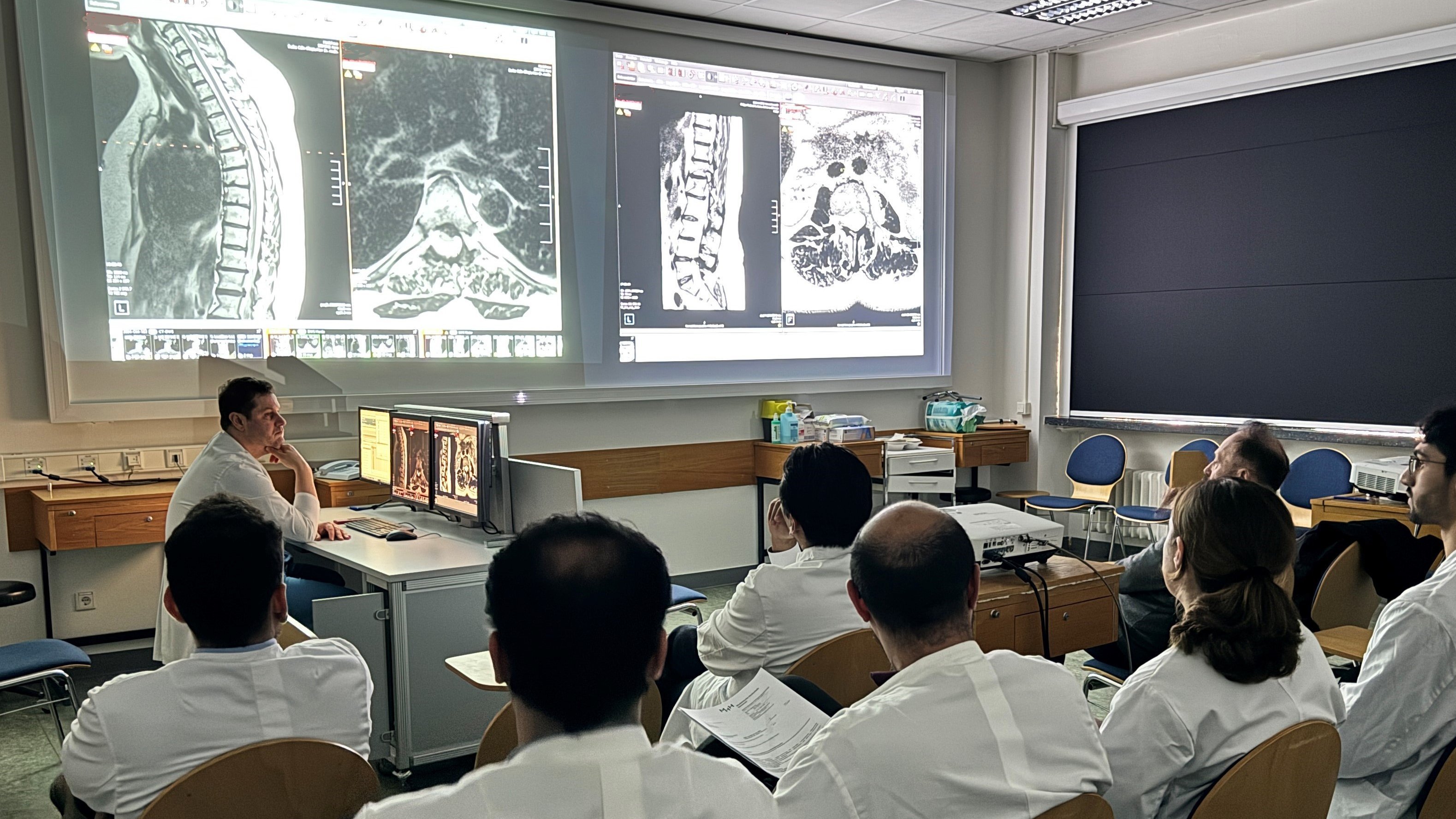
The Department of Neurosurgery regularly offers clinical traineeships to interested medical students. During these clinical traineeships, you can gain an insight into surgical activities in the field of neurosurgery as well as the responsibilities and procedures within the neurosurgical wards.
During your time with us, you will become familar with the various aspects of neurosurgical diagnostics and treatment. You will be integrated into the daily work on the wards, in the operating room and in the outpatient clinic, giving you a comprehensive understanding of the speciality. Our clinical traineeships are designed to complement your theoretical knowledge with practical experience and to facilitate your transition into clinical practice.
Please send applications by e-mail to: neurochirurgie@mh-hannover.de
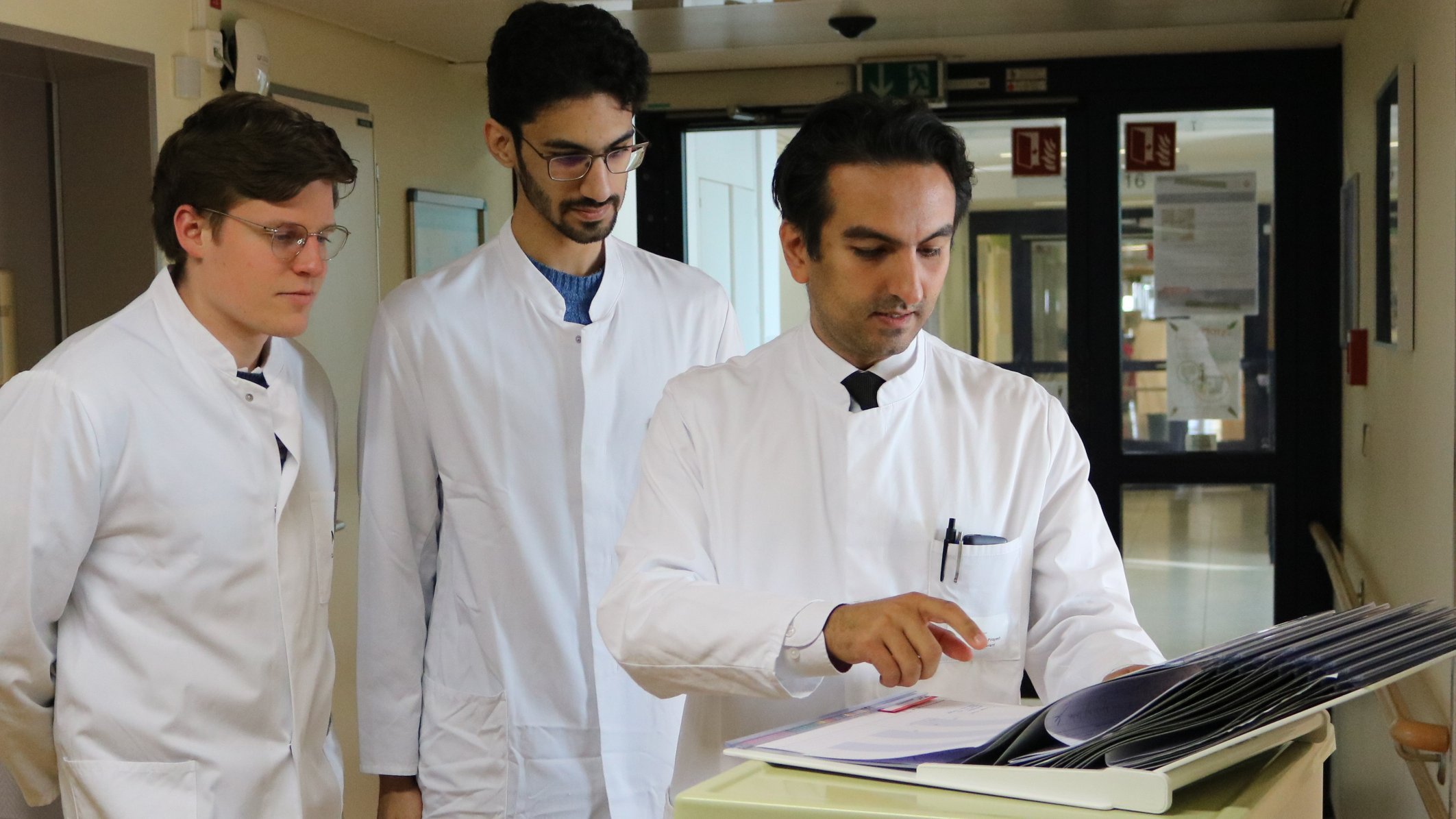
In our clinic, students have the opportunity to complete a rotation as part of thei Practical Year (PY) and further develop their medical skills under theguidance of experienced neurosurgeons. During the rotation, students will gain insight into the most common neurosurgical conditions, trauma care of the critically injured patients and the workflow of neurosurgical operations. You will learn the basics of neurological examination techniques and the assessment of clinical findings in everyday clinical practice, as well as the basics of general ward work. There is also the opportunity to actively participate in operations. PY students are actively involved in patient care and operations and are given the opportunity to work independently under supervision.
In addition to daily clinical work, we offer regular training sessions and case discussions to enhance the students' knowledge. This includes the daily neurosurgical-neuroradiological conference, as well as the weekly neurovascular boards and neuro-oncological tumour boards with interdisciplinary case discussions. We also provide further training opportunities, such as the neurological-neurosurgical colloquium, to which nationally and internationally recognised speakers on various topics are invited.
PY students receive an allowance of € 720 per month.
For further information and applications, please use the following website.
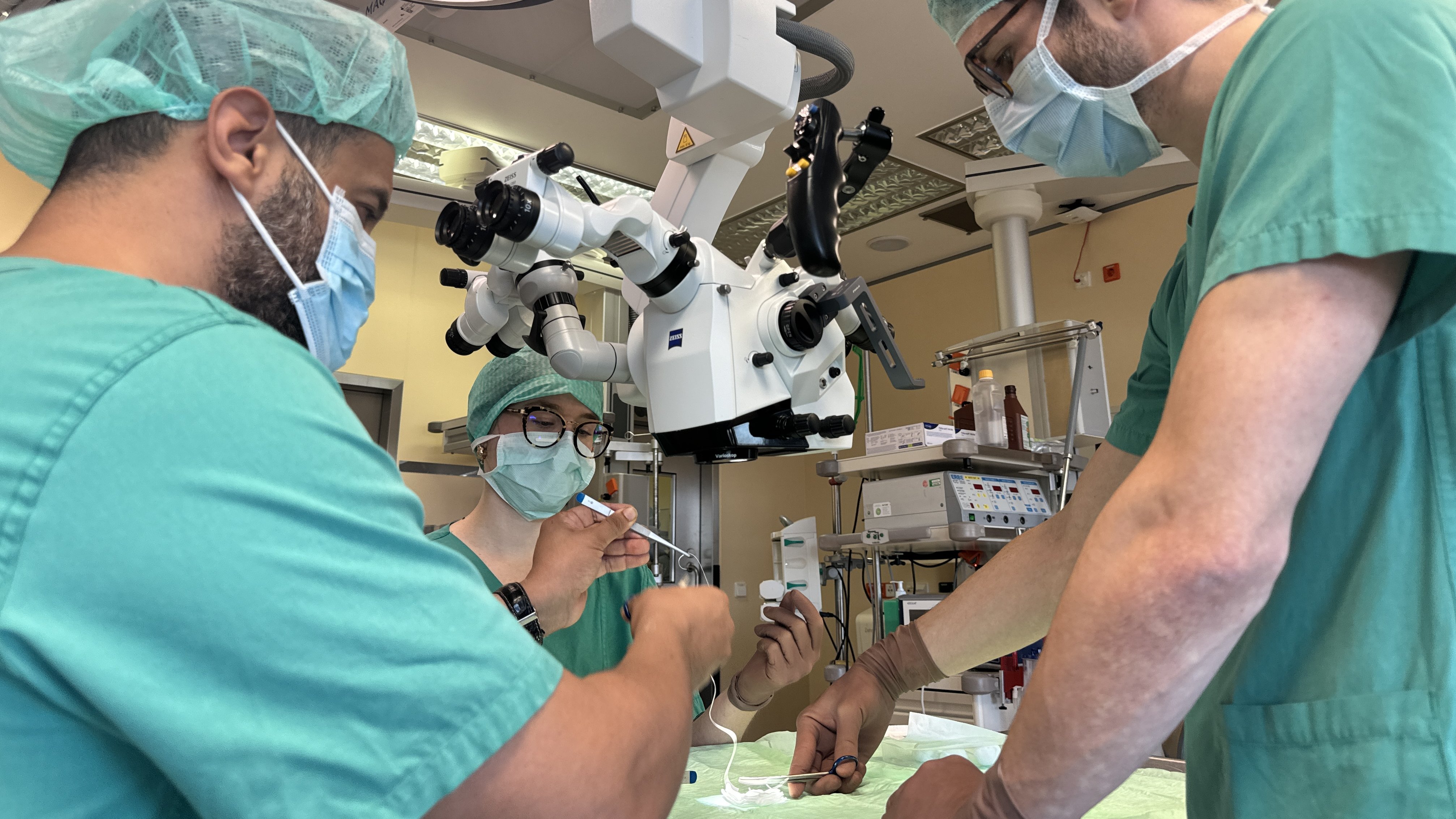
Our clinic is actively involved in student training and offers a wide range of courses, including lectures and bedside teaching in the neurology module as well as elective courses:
- General Neurosurgery Basics (for the 3rd year of study): In this course you will receive a comprehensive introduction to the basics of general neurosurgery. In addition to the clinical neurosurgical examination at the bedside of representative patients, we teach the theoretical basics of the most common neurosurgical diseases in seminars. We place particular emphasis on the indication and assessment of instrument-based, problem-oriented diagnosis and treatment of brain tumours, vascular malformations, hydrocephalus, degenerative and disc-related spinal diseases, neurotraumatology, paediatric neurosurgery and pain therapy. You will learn about modern computer-assisted surgical procedures with intraoperative monitoring procedures, including the routine use of the surgical microscope, neuronavigation and intraoperative electrophysiological monitoring of the cranial nerves. Insights into various neurosurgical operations and demonstrations in the operating theatre are essential components of the course and enable you to deepen your theoretical knowledge in practice.
- Neuro-oncology and tumour surgery (for the 4th year of study): You will learn about modern computer-assisted surgical procedures with intraoperative monitoring procedures that enable intraoperative safety and function-preserving tumour resection, even in eloquent areas of the brain. This includes the routine use of the surgical microscope, neuronavigation and intraoperative electrophysiological monitoring of the cranial nerves. In addition, minimally invasive surgical procedures as well as neuroendoscopy, stereotaxy, fluorescence-guided tumour resection and neuronavigated biopsy for securing tumour tissue are available for microsurgical brain tumour removal.
- Stereotactic and functional neurosurgery (for the 5th year of study): You will gain insight into stereotactic procedures performed in the clinic. This includes deep brain stimulation, a neurosurgical procedure in which stimulation electrodes are inserted into specific areas and nuclei. Once the interdisciplinary indication for deep brain stimulation has been determined by the neurosurgeon in collaboration with neurologists or psychiatrists, the target points for the stimulation electrode are calculated on the screen with millimetre precision on the basis of CT and MRI images, supported by special computer programmes, and the path through the brain tissue is simulated three-dimensionally in advance in order to minimise the risk of injury to blood vessels or functionally important areas of the brain. After placement of the stereotactic ring, the procedure is performed on the awake patient under intraoperative monitoring using electrophysiological single-cell recordings and microstimulation for intraoperative confirmation of the exact target point and optimisation of the stimulation success. Other functional neurosurgical procedures relate to the treatment of chronic nerve pain: here you will learn about both ablative and stimulating procedures such as spinal cord stimulation, ganglion stimulation, peripheral nerve stimulation and occipital stimulation.
These courses are designed to provide students with in-depth theoretical knowledge and practical skills at the same time. Through direct contact with our lecturers and participation in interactive courses, learning with us is an exciting and enriching experience.
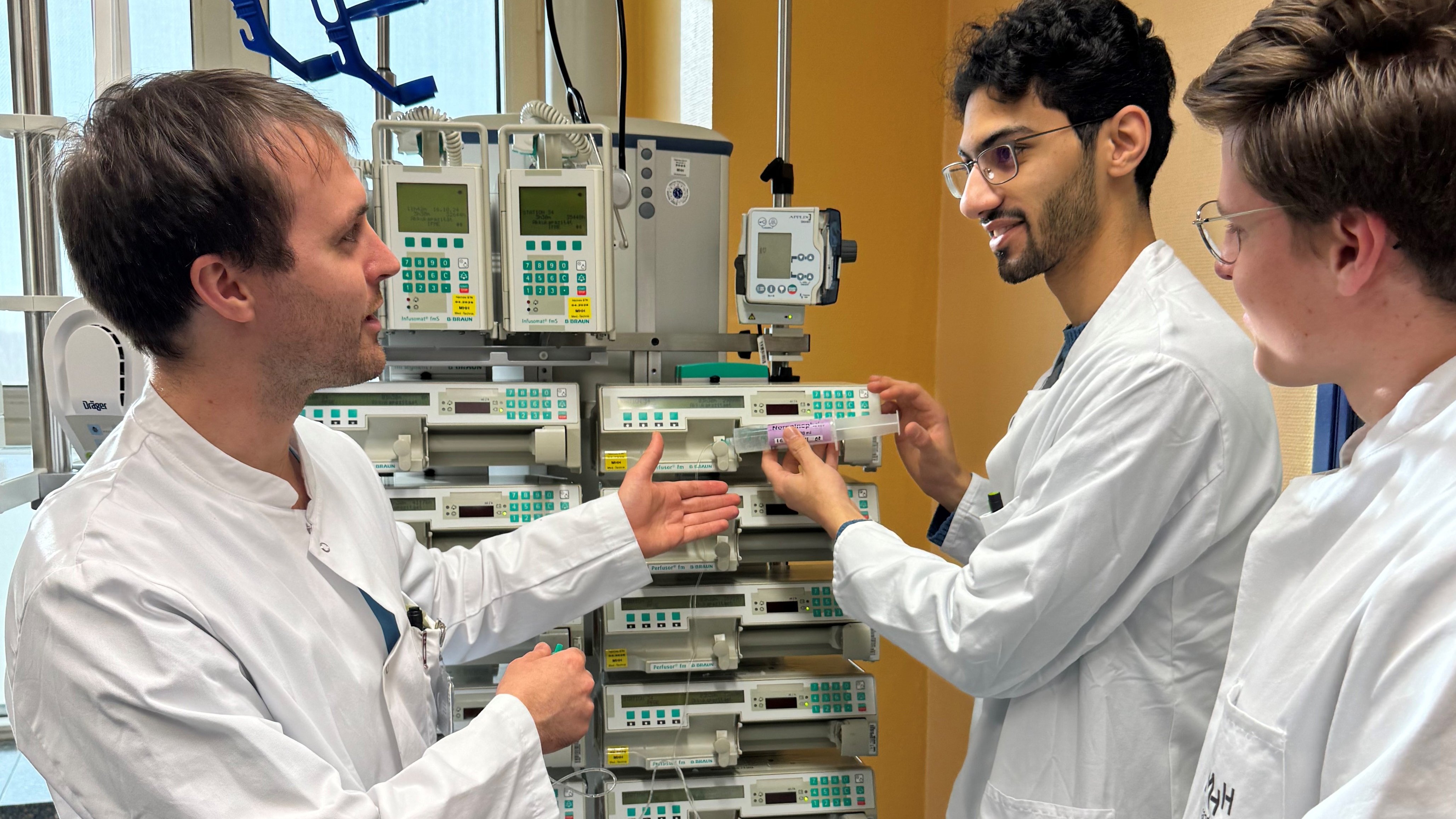
The Department of Neurosurgery is always looking for licensed physicians who are interested in neurosurgery and are interested in specialist training.
Please send your application with cover letter, CV and references either by post to: Prof. Krauss - Clinic for Neurosurgery - Carl-Neuberg-Str. 1 - 30625 Hannover or hand in the documents in person to Prof. Krauss' office (K5-04-4010).
![[Translate to Englisch:] Copyright: NCH/MHH](/fileadmin/_processed_/8/2/csm_IMG_4205_10a16e6bfb.jpg)